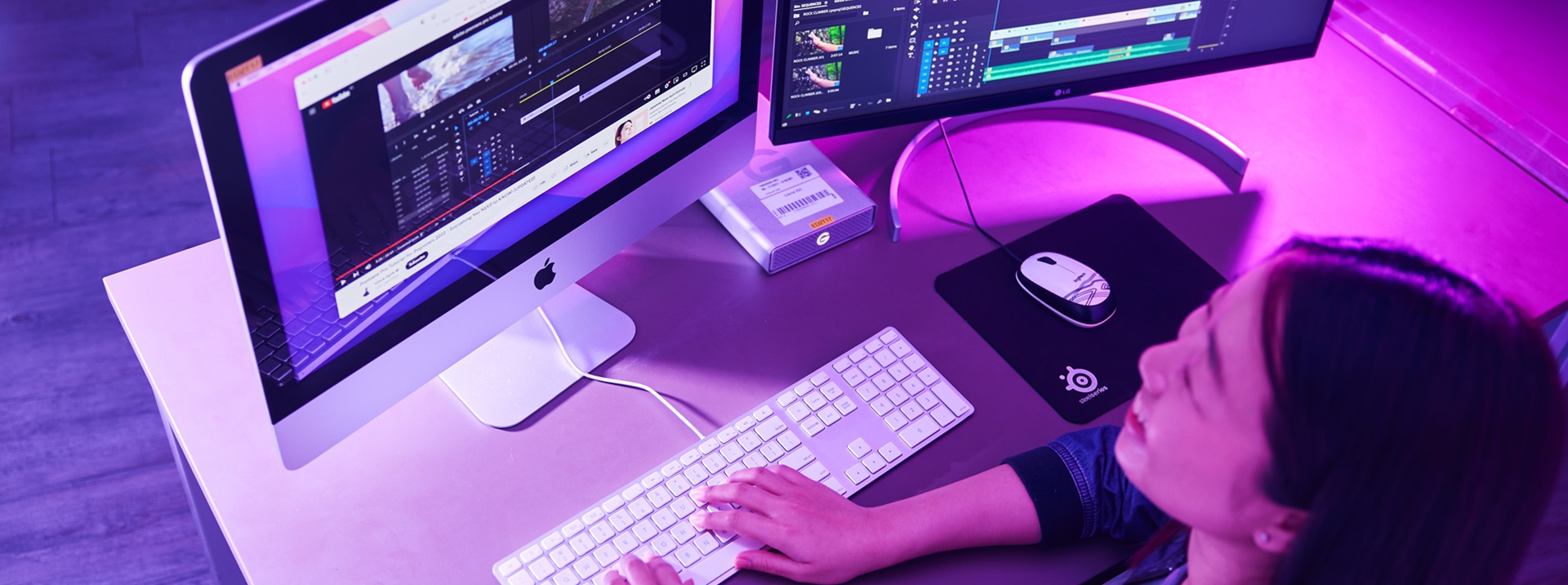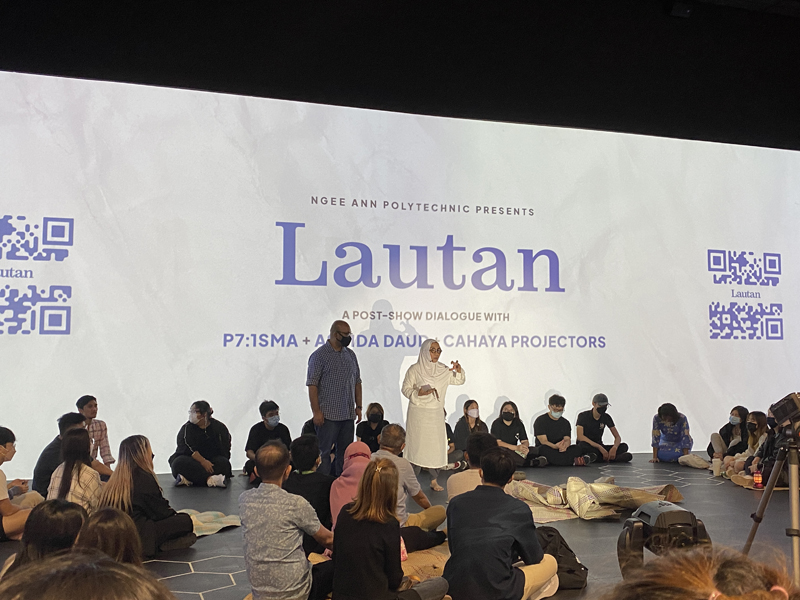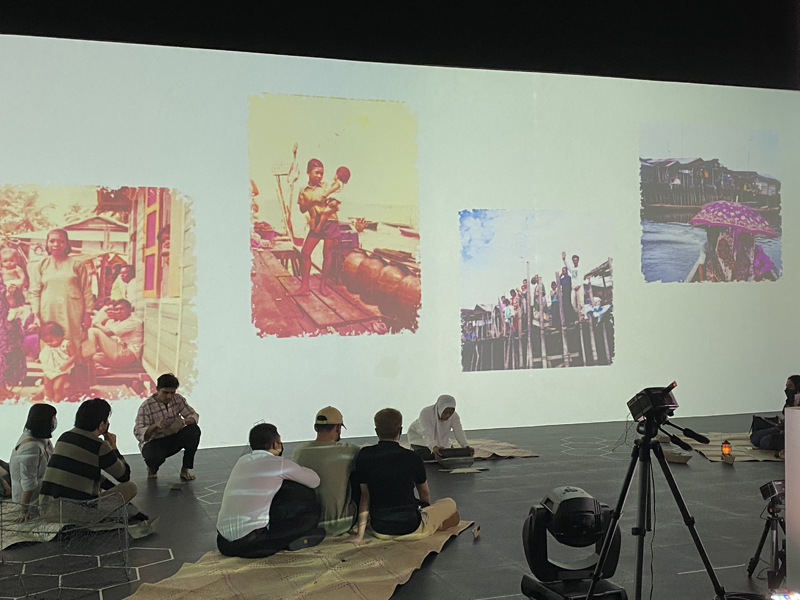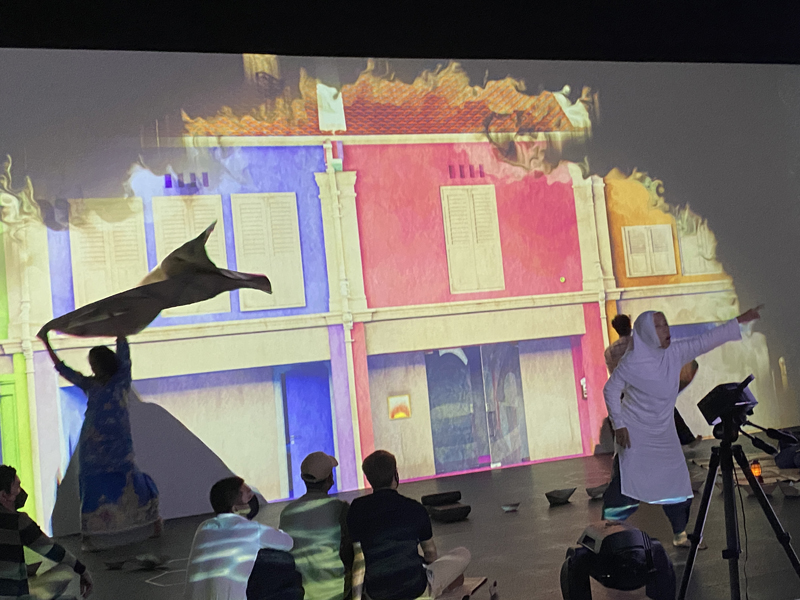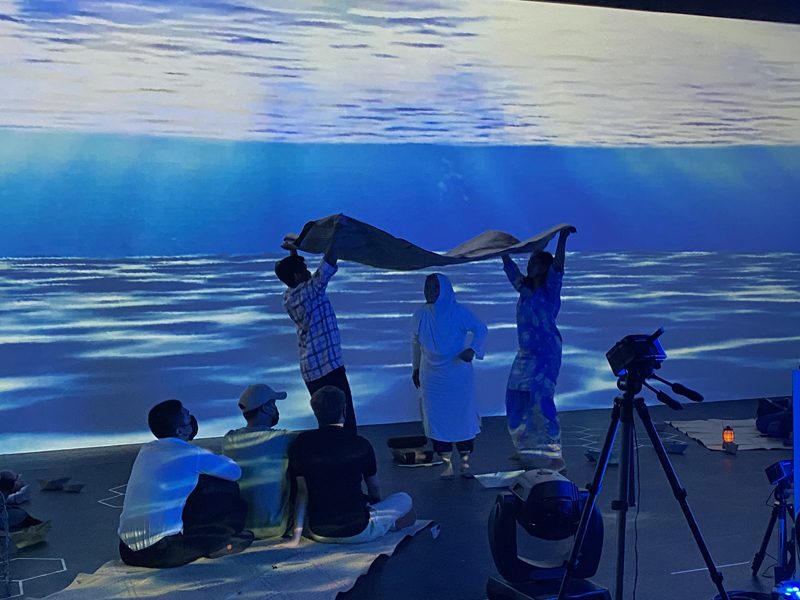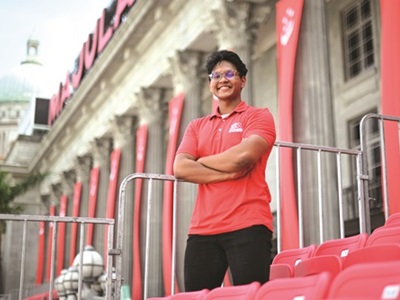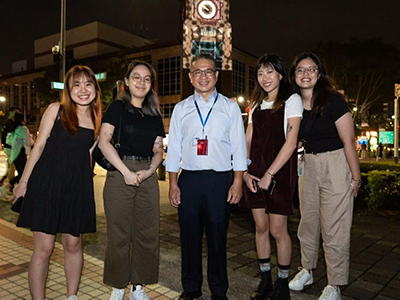Why MPP?
- The only poly diploma in Singapore that covers projection mapping, virtual production and technical theatre to produce creative work for digital screens and live stage performances
- Be future-ready with in-demand digital skills through our training in the latest technology, digital tools, and industry trends
- Gain real-world experience by working on large-scale live and virtual shows
- Create stunning visual displays and mixed reality content at M:idea Playground, our latest on-campus media facility designed for immersive learning
About MPP
Do you dream of creating interactive digital
installations at the ArtScience Museum or producing
light art installations and multimedia shows at events
like the Singapore Night Festival and i Light Singapore?
With the Diploma in Media Post-Production (MPP), you
can turn your creative ideas into reality.
In post-production, elements such as pacing, music,
scene transitions, images and sound come together
to propel the story, engage the audience, and create
a multisensory experience. You will learn cutting-edge techniques to shape, craft, and enhance stories
through sound, visuals and text, as well as how to
design, plan and manage live/virtual shows and
events.
You will start by mastering the fundamentals of post-production, including motion graphics, audio and video
editing, as well as studio multi-camera production.
Additionally, you will develop storytelling techniques,
explore design principles, and sharpen your skills in
immersive content development.
Our partnership with The Star Performing Arts Centre
gives you access to a large-scale technical theatre,
where you will learn to seamlessly blend technology
and art with lighting, sound, props, and costumes for
live events. You will also gain hands-on experience
with projection technologies, and bring your work
to life on stage and in immersive environments. This
comprehensive training will prepare you for the highly
sought-after role of a creative technologist.
For your capstone project, you will work on projection
mapping, live stage and virtual production projects
sponsored by the biggest names in the industry such
as AUX Media Group, Pixotope, Marina Bay Sands,
and National Heritage Board. Furthermore, you will
deepen your skills, build an outstanding portfolio, and
expand your professional network during your 4-month
internship.
Overview of Your MPP Journey
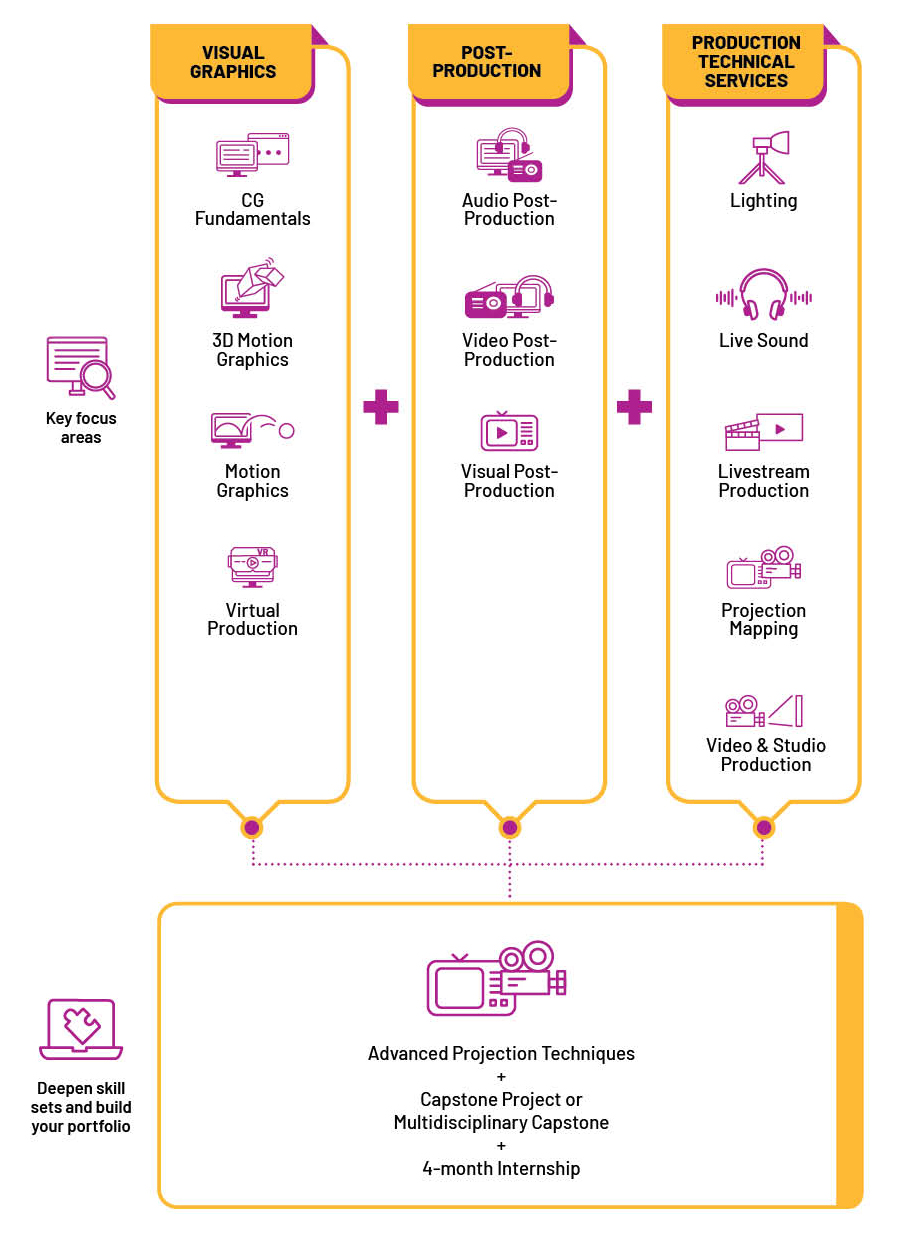
Inspiring Portfolio
Stories Come Alive in Live Performance
In a collaboration with P7:1SMA dance company and local Malay spoken word artist Asnida Daud, MPP final-year students presented a live performance showcase to more than 80 guests on 29 July 2022. Titled “Lautan”, which means “ocean” in the Malay language, the performance fused dramatic dreamscapes created by projection mapping techniques with dance and poetry to celebrate the history of Singapore’s indigenous Orang Laut community. Through the visually stirring graphics, the students impressed with their ability to create an immersive experience.
Further Studies
You enjoy generous advanced standing for some degree programmes at local or overseas universities. For example, the Queensland University of Technology offers FMS graduates 18-month advanced standing for its Bachelor of Fine Arts programme. With your diploma, you may also apply for many programmes in the local universities.
Careers
With the increasing demand for multi-skilled visual effects producers, you will be able to find employment in the media post-production, live stage show, Meetings, Incentives, Conferences and Exhibitions (MICE), as well as Arts and Entertainment industries. These roles include:
- 2D/3D Artist
- Assistant Designer
- Assistant Producer
- Events Crew
- Floor Manager
- Junior Animator
- Junior Graphics Designer
- Lighting Designer
- Motion Graphics Artist
- Post-Production Assistant
- Production Assistant
- Stage Crew Technician
- Sound Designer
- Sound Editor
- Sound Recordist
- Video Editor
- Vision Mixer
- Brain Bar (Unreal Artists)
- Virtual Production Supervisor
Entry Requirements
AGGREGATE TYPE ELR2B2-A
To be eligible for consideration, candidates must have the following GCE ‘O’ Level examination (or equivalent) results.
| Subject | 'O' Level Grade |
|---|---|
| English Language | 1-6 |
| Additional Mathematics/Mathematics | 1-7 |
| Any one of the 1st group of Relevant Subjects for the ELR2B2-A Aggregate Type | 1-6 |
Applicants must also fulfil the aggregate computation requirements for the ELR2B2-A Aggregate Type ( English Language, 2 relevant subjects and 2 other best subjects) listed at www.np.edu.sg/docs/ELR2B2.pdf.
For students with other qualifications, please refer to the NP website for the entry requirements and admissions exercise period.
Candidates with colour vision deficiency, severe vision deficiency or hearing deficiency may encounter difficulties meeting the course requirements and expectations.What You Will Learn
Introduction to Film & Media (4 Credit Units)
This module examines multi-platform content and the digital platforms and technologies by which the content is delivered (virtual conferences, streaming, blogs, social media, online videos, immersive experiences). Students will appreciate and analyse a variety of media with different perspectives based on multiple platforms to reach an audience. By the end of the module, students will become more literate “producers” and critics of multi-platform media today.
Storytelling Techniques (3 Credit Units)
This module scaffolds and synthesises storytelling, functional writing, and research techniques, to create engaging multi-platform content. Through the module, students will be taught the tools to effectively ideate compelling story and content ideas and efficiently craft considered and professional written treatments and proposals, with which to present their content and engage audiences across media platforms.
Video Production (4 Credit Units)
This is a foundation module introducing students to single-camera video production. The module gives students hands-on experience with pre-production planning, single-camera operation, location lighting, grip work, sound recording and non-linear
video editing. Students will gain an understanding of working with moving images and learn to combine them with simple soundtracks to create compelling content.
Motion Graphics (4 Credit Units)
This module gives students hands-on experience in creating motion graphics for digital media. Students will be taught skills such as visual design and the creation of computer-generated graphics in service of multi-platform commercial media productions (video, immersive media, social media, etc.).
Integrated Marketing Communications (4 Credit Units)
This module introduces students to the basic principles and concepts of marketing communications, with an emphasis on promotion in marketing. Students will learn about marketing and how its promotional elements must be integrated to communicate effectively. Students will apply basic skills in research and market analysis to plan and develop a marketing communications campaign.
Career & Professional Preparation I (1 Credit Units)
This module gives students a foundational introduction to their three-year diploma course curriculum and how it prepares them for industry. Through guided reflection of their personal characteristics and the development of an overall game plan for their education and career goals, students will be better prepared for their future careers.
Health & Wellness^ (1 Credit Unit)
This is a Level 1 Core module for all Year 1 students. The module will introduce students to the importance of maintaining both physical and mental health through the knowledge and monitoring of health indicators, and application through appropriate exercises. The aim of the module is to empower students with basic knowledge and skills to be independent and responsible in maintaining overall personal health.
English Language Express^* (Credit Units - NA)
English Language Express aims to give you a better grounding in the English Language and to strengthen the written and oral communications skills that you will need in your academic and professional careers. You will be engaged in writing, reading, listening and speaking activities that will develop your ability to speak and write grammatically, coherently and clearly. You will also hone your reading and listening comprehension skills.
^ Critical Core modules account for 10 credit units of the diploma curriculum. They include modules in innovation and world issues, as well as an interdisciplinary project. By bringing students from diverse diplomas together, the interdisciplinary project fosters collaboration to explore and propose solutions for real-world problems. NP aims to develop students to be agile and self-directed learners, ready for the future workplace.
^* For selected students only.
This module provides introductory knowledge in the area of post-production as well as hands-on editing experience. Students will learn the finer details of editing for a narrative-driven project. Through exercises and reflection, they will have many opportunities to become familiar with the various concepts of editing.
Introduction to Production Management (4 Credit Units)
This module introduces students to the production workflow for location and venue setup, focusing on a range of activities from liaison with other vendors to scheduling of rehearsals, performance as well as post-event activities such as crowd control and environmental logistics.
Studio Production (4 Credit Units)
Students build on the multi-camera studio production skills and bring this set of skills to locations and venues. They will be exposed to various forms of location multi-camera setup and edit multi-stream content to produce trailers and highlights of events.
Audio Production (4 Credit Units)
Students are taught the knowledge and skills from analogue to digital audio production here. They will learn the basic principles and technical concepts of sound production and technology. Foundational production skills developed in recording, overdubbing, processing and mixing can be applied to produce audio for video, television, film, radio and music products.
Confident Communication: Find Your Voice (VOICE)^ (3 Credit Units)
The VOICE module aims to empower students to become thoughtful and confident communicators able to tailor a message to suit audience, purpose and context. Students will learn how to use storytelling structures and techniques, persuasive strategies and effective visuals to connect meaningfully with their audience. Through a personalised growth plan, the module encourages students to reflect, set goals and take ownership of their growth and development as communicators. The module employs engaging teaching strategies such as games, thinking routines, masterclasses and workshops, and a celebratory showcase festival at the end to make learning fun and exciting.
Innovation Made Possible^ (3 Credit Units)
Underpinned by the Design Thinking framework, Innovation Made Possible aims to build creative confidence in you. The module will sensitise you to the process of user-centric problem solving and allow you to discover and hone your innate ability to think creatively, come up with innovations to tackle problems and explore new ideas for your studies and beyond.
^ Critical Core modules account for 10 credit units of the diploma curriculum. They include modules in innovation and world issues, as well as an interdisciplinary project. By bringing students from diverse diplomas together, the interdisciplinary project fosters collaboration to explore and propose solutions for real-world problems. NP aims to develop students to be agile and self-directed learners, ready for the future workplace.
3D Motion Graphics (4 Credit Units)
Students conduct research to understand the concept and obtain ideas and visual references to create simple 3D models for the environment, inanimate objects and characters. They also learn to refine 3D models iteratively to achieve the artistic vision and production requirements.
Students are introduced to creating digital media for various platforms such as projection, AR & VR. Students will build on their knowledge of motion graphics & 3D skillsets to produce compelling visuals and animate to audio tracks for projection, create meaningful contextual AR content and be exposed to VR environment creation.
Lighting (5 Credit Units)
This module enables students to learn the technical and creative aspects of stage lighting. Topics include basic design, colour and exposure theory, types of lighting instruments, power distribution, control, safety, proper hanging, connection, focus, and control of instruments. Upon completion of this module, students will be able to perform creative lighting layout, install concert lighting, explain colour theory, integrate lighting control instrumentation, and set up a variety of motion lighting instruments.
Live Sound (4 Credit Units)
This hands-on module teaches students the concepts and technical skills required for live event sound reinforcement. Topics include the operation of a basic sound system using interconnected components such as consoles, amplifiers, speakers, processors and microphones. Upon completion of this module, students will be able to apply the concepts of live sound reinforcement to set up and operate a small to medium-scale sound system for a live event, and to customise a recording set-up based on the ambience and multimedia requirements.
Career & Professional Preparation II (2 Credit Units)
This second-year module is designed to equip students with the necessary skills to seek and secure work, as well as communicate their personal brand. The module will help students better understand their course-related media sectors and equip them with the necessary skills – written, verbal and presentation – to market themselves effectively when pursuing a career in the media industry.
World Issues: A Singapore Perspective^ (2 Credit Units)
This module will expose you to a wide range of global issues viewed and discussed in the context of Singapore as a nation state. You will be guided to critically examine current affairs from various perspectives and develop an appreciation of the dynamism behind real world problems and possible solutions. The intent of this module is to develop thinking students with well-considered perspectives who are able to articulate reasonable opinions, make thoughtful decisions and informed choices as active citizens in society. You will also be exposed to a multidisciplinary approach in the mitigation of global challenges and thus be adequately prepared to handle the Year 3 interdisciplinary project – Project ID.
^ Critical Core modules account for 10 credit units of the diploma curriculum. They include modules in innovation and world issues, as well as an interdisciplinary project. By bringing students from diverse diplomas together, the interdisciplinary project fosters collaboration to explore and propose solutions for real-world problems. NP aims to develop students to be agile and self-directed learners, ready for the future workplace.
Students will learn the basic knowledge and skills needed for capturing good sound on location in support of sound design. They will also learn the different techniques employed by professional sound recordists and discover how location sound can be enhanced in audio post-production via sound design. With an introduction to ProTools, students will be able to produce basic sound tracks for short films through location sound recording, sound design, editing and mixing.
Virtual Production (4 Credit Units)
This module will provide students with training in augmented reality and virtual reality technologies for entertainment and audience engagement. Students will also learn virtual production skills for film, TV and live event production.
Livestream Production (5 Credit Units)
In this module, students will build on the multi-camera studio production skills and bring this set of skills to locations and venues. They will be exposed to the emerging format of livestreaming that is currently a fast-growing broadcast platform and edit multi-stream content to produce trailers and event highlights.
Projection Mapping 1 (4 Credit Units)
In this module, students learn the characteristics of various projections technology from LED panel to laser projector, appreciating the technology and its limitation. They also learn to convert traditional content for multi-panel display as well as multi-platform delivery such as concurrent live streaming, digital recording and projection.
Video Post-Production (4 Credit Units)
From building knowledge in basic non-linear video editing to more advanced post-production skills such as colour correction, online and offline workflow, this module will provide students with a thorough education in editing skills and post-production - with every student working on their own post-production system.
In this module, students build on their knowledge of the various projection technologies to create complex professional-level projection mapping installations, on real-world venues in collaboration with industry partners.
Capstone Project (10 Credit Units)
Using the conceptual and applied knowledge learnt in Year 1 and 2, students hone and integrate their skills through managing and operating the school’s flagship business units, working with external clients on real-time projects, working on their own projects in various disciplines and across disciplines or carrying out freelance engagements. All projects will provide students with hands-on experience in incorporating various skills, platforms and mechanisms to achieve the desired impact in the marketplace.
Industry Immersion Programme I (10 Credit Units)
Students who prefer more working experience can opt for this programme, allowing them to work for one year with our partner organisations such as Mediacorp, SPH Media, Mothership and The Smart Local.
Project ID: Connecting The Dots^ (4 Credit Units)
Project ID aims to prepare you for an increasingly globalised and interconnected world where problems are multi- faceted and require interdisciplinary research and collaboration to solve. Using a project-based learning approach, you will have the opportunity to work in a multi-disciplinary team with students from across the polytechnic to investigate and propose comprehensive recommendations for a pressing real-world problem affecting Singapore. You will be guided to step out of your disciplinary silos and effectively communicate and collaborate with peers from different backgrounds. Ultimately, the module seeks to develop independent learning skills and the ability to synthesize diverse strands of knowledge to solve a complex problem, while impressing on you the importance of being a responsible global citizen.
^ Critical Core modules account for 10 credit units of the diploma curriculum. They include modules in innovation and world issues, as well as an interdisciplinary project. By bringing students from diverse diplomas together, the interdisciplinary project fosters collaboration to explore and propose solutions for real-world problems. NP aims to develop students to be agile and self-directed learners, ready for the future workplace.
Internship (Local/Overseas) (16 Credit Units)
Students will be placed on an internship with companies and agencies matching their abilities and interests. The internship gives students opportunities to apply their acquired knowledge and skills to the work environment. Students gain valuable work experience and exposure to the rigour, demands and excitement of the media industry, enabling them to adapt effectively to future employment. Many of our students are offered employment by these same companies.
Industry Immersion Programme II (16 Credit Units)
Students who prefer more working experience can opt for this programme, allowing them to work for one year with our partner organisations such as Mediacorp, SPH Media, Mothership and The Smart Local.
